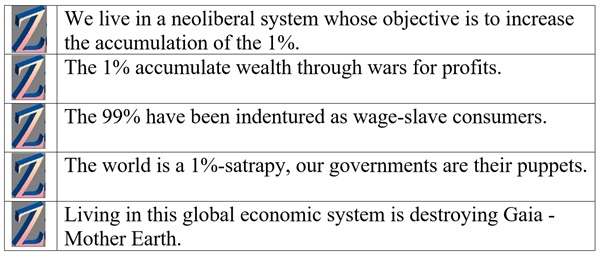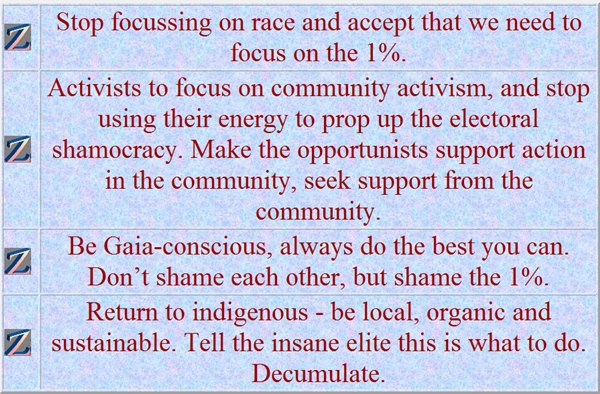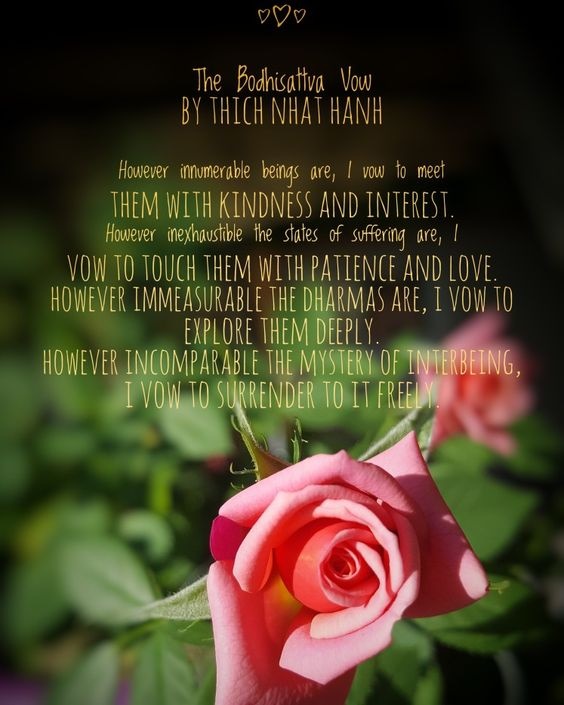|
ZANDTAOMED MANUAL
Email Zandtao:- |

|
ZANDTAOMED MANUAL
|
|

|
|
|
13. Complete Disenchantment I began this book as a follow-on to the Treatise. In the final section of the Treatise I had discussed the path and Gaia, and throughout the book had made references to activism, political or otherwise. Connecting these is pathtivism, and this was to be a book about how to be a pathtivist. In the first section of this book (Outer Engagement) I demonstrated how much the path was needed in the world of activism. Through personal anecdotes as well as consideration of activism in general, I examined how people being on the path would benefit the movement because spiritual attributes could help avoid the many ego problems that exist in the world of activism. In the second section I continued the inner search that I had described in the Treatise. In the initial plan for the manual this section was meant to be an encouragement of the inner journey for activists, however it coincided with a development of my own inner search that led to development of integration within Gaia-consciousness. With this integration in the context of Dhamma, I have reached a position in which I am completely disenchanted with any form of political activism. Note I used the word political. Anyone following the path will be some form of activist, activism is necessary. But I am now completely disenchanted with the world of politics, and this is not an emotional response. This is a response of the path, a response of mindfulness. I would never have envisaged complete disenchantment as being the mindful understanding that would come from a mindful analysis in the outer engagement for people on the path. Complete disenchantment sounds emotive but in fact it is a recognised legitimate spiritual understanding, and when I describe where it arises spiritually it is only logical that it should apply politically. Complete disenchantment comes from an understanding of dukkha, and the first Noble Truth. Let me put the first truth in the context of all four before focussing on how I came to the conclusion. When we understand the 4NT we begin by recognising that around us is suffering. On a personal level this suffering is caused clinging to desire, and the 4th Truth offers us a path out of suffering. Where does the suffering that is all around come from? It comes from all the personal suffering that arises from our conditioning, and it comes from all the suffering that arises from our political and economic system. These two sufferings are interwoven. If individual suffering were ended because everyone did not attach to their desires, the political and economic system would naturally be replaced by some form of compassionate system. If a compassionate system replaced the current exploitation that is our political and economic system, then far more people would be able to stop clinging to desire and would be able to follow the Noble 8-fold Path. But both ifs are highly theoretical, and the reality is that we are suffering because we are clinging to our desires. Further the reality is that the political and economic system greatly exacerbates the conditioning that creates the clinging to desires, and both the personal and systemic create suffering. Now one of the techniques for practicing the teachings of the 4NT is to recognise that there is nothing beneficial coming from desire. Through a mindful understanding of desire and its consequences we become completely disenchanted with desire and this helps us quench the fire of clinging. Before we can follow the path of liberation (from desire) we have to know that desire offers us nothing, and that we become completely disenchanted with the world of desire. This is mindfulness of desire – complete disenchantment. Now spiritually what is activism concerned with? Put simply – compassion, ending suffering for all. Political activism would be an approach in which activism would lead to a compassionate political system. When described like this, it would be obvious that a spiritual person would become active in trying to develop a compassionate political and economic system. But when we were coming to terms with desire we used mindfulness to grasp the understanding of desire, clinging to desire and the consequences – leading to complete disenchantment with desire. So now we use mindfulness to understand our political and economic system. In the first section of outer engagement pathtivism developed various understandings about how the political and economic system functions, and how people interact with this system. Political activism focusses on the electoral system in the hope of electing representatives who would develop compassionate policies in democratic government. Let’s look at that premise mindfully. Before you read the rest of this chapter make sure that you have found some sort of path because without the path to fall back on, this chapter could be suicidal. Do NOT read it without the path. Seriously do NOT read it without the path. Or at least read it together where you can help each other. No drugs in the house, just path. Is it wise to do stuff that is a complete waste of time? So why don’t we apply that to political involvement? Consider Jeremy Corbyn who was always a bit Trotty for me. But he stood the course of time with all his good work in Islington and became a left hero when he was voted as Labour leader. How effective has he been? None. Why? The 1%-satrapy won’t let him. He suffers abuse from erstwhile comrades, young people came out to support the popular genteel old man, yet now he is mocked. What about Harry Perkins, working-class socialist from Sheffield, the Labour leader in the 80s who was voted in on a landslide to bring about change, and the establishment got in the way. OK that was Chris Mullin’s excellent fiction, A Very British Coup. Not too dissimilar, Harry Perkins and Jeremy Corbyn – except Chris did not talk of the establishment weapon of the targetted calls of antisemitism. Electoral socialism hasn’t worked with Corbyn, comrades’ lifetimes of energies dissipated fruitlessly. Let us consider further applying our spiritual techniques to determine the validity of political involvement. Let us examine the political strategy of electoral politics. Embrace this strategy. Look with deep honesty at the possibility of 99% voting for a good person to have power, and more importantly how the 1% will allow their apparatus (media etc.) to let this happen. No chance. Can we ever overcome the systemic conditioning that accepts war and wage-slavery? No chance. Will the strategies of alienation ever work? Or will people be bought off? If a good government for the people were voted in would the 1% allow policies that would take away their profit-making? No chance. What about the state of Gaia? The planet is being destroyed with all its potential threat to humanity. Do the 1% work to change this for the better? No. The Koch brothers finance climate denial (below), and the biggest cause of damage, the US, now has a president who supports climate denial. Look at any political movement, will it work? What about Wolfie? Come the revolution we will put the 1% up against the wall. Can that ever happen? Now the 1% can buy “security” (weaponry) that can destroy armies. Who are you kidding? Look at this Zandtao narrative:-  Is there any way that political process can change so that their narrative is this compassion narrative? No chance. Look at every scenario. Can we win? Maybe …. Look again. Can we win? Maybe …. Look again. Can we win? The answer is no. If you have not reached the answer of no, then are you looking clearly? Are you on the path? Have you been able to face the truth? Perhaps you should forget this and go back to chapter 1. And if you are forcing yourself to say no, stop, you will hurt yourself, give yourself pain. Stop. Perhaps you should go back to chapter 1 and learn more about yourself. Let us use our mindfulness to improve our understanding of electoral politics as it now stands. What is its purpose? It is part of the 1%-satrapy so one purpose is to maintain that satrapy. What could destroy this satrapy – effective community action by the 99%. So the 1% needs a strategy to control effective community action by the 99%, and that strategy is electoral politics. Mindfully we understand that electoral politics is a strategy to diffuse effective community action by the 99%. In our upbringing we are told that to effect change we use democracy and the electoral process. We are presented the theory that the electoral system is democratic and therefore we would expect a compassionate system as a consequence. But in the education institutions of the 1%-satrapy, we are not allowed to discuss why we don’t have a compassionate system. Some would imply that it is apathy on the part of the electorate that prevents the compassion. But if apathy arises in all electoral processes then mindfully it has to be grasped that apathy is a condition of which electoral politics is the cause. In the same way the lack of compassionate system is a condition of which electoral politics is one of the causes. The root cause is the 1%-satrapy that uses the electoral system to diffuse effective community action. Look at the energy and finance that goes into the electoral process, imagine how much people would benefit if that energy and finance were put into our communities. Since this diffusing of energy and finance happens in every electoral system then it has to be mindfully grasped that this is an intended consequence of electoral politics. For a spiritual person to demand political activism as a consequence of following the path this shows a lack of mindfulness as to what happens in the electoral process. Am I saying don’t get involved in the electoral process? Of course not each person’s path is their decision. But if in that involvement you are expecting change – expecting a change from the 1%-satrapy – expecting a compassionate system to arise, you are not being mindful of the true nature of the electoral system. So you have reached the answer of no (to the question of activism in the electoral process) with full awareness – and with mindfulness, and you’re not depressed. If you are depressed, go back to chapter 1. Why are you not depressed? Because you are on the path. The path knows politically there is nothing to be done now. But the path knows there is much to be done because there is so much suffering, it just knows that the political process just adds to the suffering. Will our involvement in the political process bring about any of the zandtao narrative? The answer is no, and we need to be at peace with no. Are you at peace with no? Go back to chapter 1? Being mindful of electoral politics recognises that there is no intention for compassionate governance. This awareness comes from the recognition that electoral politics is part of the 1%-satrapy. It is not so much that the 1% are interested in the minutiae of every election and candidate, but they exert sufficient power and influence so that if a threat to their profits arises they can deal with it. With Corbyn they tainted him with antisemitism - an absolutely ludicrous charge, with Brexit happening why should a socialist be concerned with which corporations exploit the people - he is fighting allexploitation. But his leadership was compromised by the Brexit dynamic. Bernie was not supported because they had no control. Obama was a useful puppet so that it appeared there was change. Whatever Republican got in would have rolled back his environmental protections to enable their resource exploitation but Trump doing it bull-at-a-gate suits them temporarily – I just hope for the world it only suits them for 4 years. The 1%-satrapy includes the media, how much was the media responsible for attacking Corbyn? Education could be a way of recognising that there is a 1%-satrapy, that their accumulation depends on wars for profit, and their consumer exploitation depends on wage-slavery. So their influence controls the curriculum to ensure there is no awareness coming out of education. There is no societal aspect where %-satrapy does not extend. So there has to be complete disenchantment with any avenue for change because they are influenced and under the power of the 1%. Where does a rebel who cares go? The rebel knows the problem is the 1%-satrapy. If rebellion were successful and the 1%-satrapy were ended, the reduced suffering would validate the rebellion. But mindfulness shows us that there is no end to this tyranny through violence at the present time. So the only choice for a rebel is complete disenchantment that would lead to following the path. The point is politically we cannot win. Does that mean we curl up and die? Not at all, it means we follow the path. Because when we follow the path then we win. No system, no electoralism, no victory, no hope of success, we follow the path and win. What’s the point of following the path and not winning? Shouldn't we be helping people? Isn’t the path compassion? And here’s the rub, winning and compassion are not the same. Maybe in some other universe?? In this world compassion and winning isn’t happening, cannot happen at the moment. Maybe it could happen? Do we plan for this? No, because we follow the path and live in the present moment. We don’t give up on compassion, we live compassion in the present moment. That’s pathtivism. If you want to go on a rally and it feels good, go. Is it going to have any effect? No. Does the 1% respond to what the 99% do? Maybe. But only if they have to and they have calculated to make their profits elsewhere? Then they give you a token victory. Can we turn token victories into victory? No chance – complete disenchantment is the truth. A rally is good community, that’s enough, it is present moment. Results, change, these are all attachments. There’s a phrase I hate – “make a difference”. That is such an ego phrase, me and my ego can make a difference. My conference (ref chapter wherever) made a difference but it was more for me than helping humanity. What about the Oxfam people who fought me? Did they make a difference? No, because of their egos. The path has no attachments – results changes, the struggle has no results. We follow the path because it is right action in the present moment. What about the pathtivist strategies?  These are community actions, and they are right actions. Every action that fits into these pathtivist strategies brings compassion at some level. There is no I or mine in pathtivism. The right actions are compassionate. Will pathtivist actions create a compassionate system? Maybe but because every action is right, a compassionate system rises or it doesn’t – but compassion arises. Compare that with the shamocracy. Actions are not right but fit in with an objective, if the objective is successful then the actions are right. The objective has not happened so far, and recently we have moved in the opposite direction of the objective so how can the actions be right? Only emerging spirit or path can help. Many people enjoy the comforts of our conditioning. Increasing liberalism does not help when it is conditioned because of fear, not because liberalism does not have compassionate values. This fear is attached to comfort security – keeping the ego of fear, and these are egos that are manipulated in the satrapy. The path has no fear, has no ego of fear, the path is not controlled by the satrapy. Buddhism has a doctrine called anatta – no self, there is no self. We are conditioned to create egos, egos form a self that we identify as I, typically the fear self. If we don’t identify with ego, and then we don’t identify with the self then we are following the path. Venerable Buddhadasa, as do many Buddhists I think, uses the 5 khandhas to explain the doctrine of anatta. If we attach our consciousness to any of the khandhas, rupa – body, vedana – feelings, sanna – perceptions and memories, sankharas – mental concoctions, then we are creating egos and therefore a self (or selves). When talking of detaching from the 5 khandhas he would say that we must make sure “there is no I or mine in the 5 khandhas”. How do we measure our compassion? Compassion is right action in the present moment, there is no attachment to the compassion. There is no I or mine in the compassionate action. This is path. Atammayata is an expansion of anatta. Anatta talks of the concoctions that arise as self, atammayata talks of concoctions that arise through all of the khandhas (including self). This is the path. As an activist focus on right action, and don’t get sucked into the theoretical ideas that underpin even the good-hearted in politics. Electoral politics doesn’t work, socialism is a theory – a mental construct (or concoction). Only theoretically can socialism overthrow the 1%-satrapy. Whenever socialism has been used as a rallying call to overcome tyranny the resulting violence has been horrendous and the effective change is minimal. To me socialism is not the cause but violence is the consequence so a condition with the cause of socialism is violence; of course the real cause of the violence is the tyranny that is now the 1%-satrapy. But if we are ever to rally behind an ideal we have to be mindful of the consequences, and the mindful reality is there is no effective change through violence and violence leads to death – and not of the 1%. In theory socialism is compassionate, in practice it is not because the socialism that we talk of now is within the context of the prevailing 1%-satrapy, and it is not right action because of the level of revolutionary suffering. It is worth refecting greater on this complete disenchentment for the issue of Buddhism and engagement. For the Buddha to have gained his timeless wisdom he went through a process of complete disenchantment with daily life (symbolised by birth, illness ageing and death), this led to transcendence into his timless wisdom. But that disenchentment came from a complete understanding of daily life - and to understand requires some level of engagement. In the suttas that understanding is tacit because the purpose of the suttas is to deliver the Buddha's wisdom. But the process of understanding and becoming wise of the Buddha could be seen as a tacit understanding. Here is Thich Nhat Hanh's Bodhisattva Vow:-  Is this not Right Action, wise engagement in daily life? Underpinning Buddhism are the Three Refuges - Buddha, Dhamma, Sangha. It could be seen that these Refuges are Buddha's wisdom being taught by the Sangha so that the Dhamma practice is wise engagement in daily life. In Appendix F, I have gone into a greater analysis of the timeless and tacit, including strategies concerning the destruction of Mother Nature as well as the increasing technological efforts of human downgrading that are contributing to wage-slavery. I have further developed the relationship between the 3 Refuges, the Boddhisattva Vow, and the Timeless and the Tacit. In Outer Engagement I looked at how existing political activism is too wrapped up in ego, lacking discernment, how we have basically become attached to political power. We have become attached to what the 1%-satrapy offers. All people, including activists, need to follow their paths, this is what I have called pathtivism in this manual. If more and more people become active as pathtivists it will change the nature of political power, and this can only be a good thing. How will it change? I don’t know, I have no crystal ball. But I trust the path, the path is from Gaia, it will know the way. There is no I or mine in path, there is no I or mine in pathtivism; this merits trust. Finally there is a real hope for the movement that dispels complete disenchantment. At some stage the galactic guardians are going to come down to earth, humanely restart the conditioned (those not on the path) and enable the world to be run on compassionate lines by those following the path. I hope (not really Below:- Commiserations to the family of David Koch who died in August of 2019. |